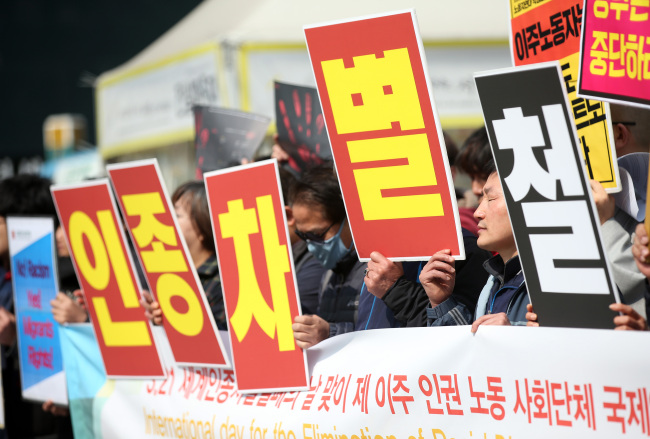South Korea’s migrant worker and refugee advocacy groups called for an end to racial discrimination in central Seoul on Monday, marking the U.N.-designated day to combat racial discrimination.
In a press conference held at Gwanghwamun Square in the morning, some 30 civic organizations, including the nation’s first migrant workers’ union, groups of public interest lawyers and labor rights activists, gathered to shed light on the plight of migrant workers here.
The groups accused the government of “institutionalizing” discrimination against migrant workers through discriminatory policies.
“Migrant workers are on the edge of society suffering from human rights violations though (the) South Korean government invited them to fill low-pay jobs,” they said in a statement. “The current system of hiring foreign workers is a de facto slavery system, as migrants are forced to endure low pay, heavy workloads and long working hours.”
The South Korean government launched an Employment Permit System in 2004 to invite unskilled workers from 15 nations, mostly in Central and Southeast Asia, to fill jobs left vacant by Korean workers.
As of December 2015, 1.89 million foreign nationals resided in Korea, 3.7 percent of the entire population of 51 million.
Under the scheme, migrants can work for up to three years and extend for one year and 10 months if their employers agree.
In a press conference held at Gwanghwamun Square in the morning, some 30 civic organizations, including the nation’s first migrant workers’ union, groups of public interest lawyers and labor rights activists, gathered to shed light on the plight of migrant workers here.
The groups accused the government of “institutionalizing” discrimination against migrant workers through discriminatory policies.
“Migrant workers are on the edge of society suffering from human rights violations though (the) South Korean government invited them to fill low-pay jobs,” they said in a statement. “The current system of hiring foreign workers is a de facto slavery system, as migrants are forced to endure low pay, heavy workloads and long working hours.”
The South Korean government launched an Employment Permit System in 2004 to invite unskilled workers from 15 nations, mostly in Central and Southeast Asia, to fill jobs left vacant by Korean workers.
As of December 2015, 1.89 million foreign nationals resided in Korea, 3.7 percent of the entire population of 51 million.
Under the scheme, migrants can work for up to three years and extend for one year and 10 months if their employers agree.

But migrant workers and civic groups have blasted the system for being too employer-friendly, taking issue with how the system does not allow workers to change workplaces and pays them severance money only after they return to their home countries, among other issues.
Last year, the National Human Rights Commission of Korea said that it received 37 complaints related to racial discrimination. “Given that foreign workers illegally residing in Korea have difficulties in filing complaints, we expect the number of discriminative cases to be higher,” an official from the agency said.
A recent poll of 560 foreign workers from 17 countries in Gyeonggi Province by the Gyeonggi Institute of Research and Policy Development for Migrants’ Human Rights found that migrant workers experienced discrimination most commonly at work (43.7 percent), followed by on streets (27 percent) and at restaurants and stores (18 percent).
The United Nations Special Rapporteur on racism, Mutuma Ruteere, had urged during his visit to South Korea last year to enact a comprehensive antidiscrimination law to curb racism and xenophobia, given the country’s history of ethnic and cultural homogeneity.
South Korea has attempted to legislate the antidiscrimination bill aimed at rooting out discrimination on such grounds as gender, disability, age, race, marital status and religion for the past decade. But it has since been scrapped at the National Assembly.
The migrant workers and their rights groups also expressed worries over the recently passed “antiterrorism” act, claiming that the government’s crackdown on the Muslim community in Korea has intensified since the terrorist attacks in Paris last year.
The government released a series of measures to step up monitoring on suspected terrorists traveling in and out of country in recent months, including expansion of the government’s access to the personal information of foreigners.
“Existence of migrant workers is not a danger. Prevalent racism poses a bigger threat to society as it hurts diversity and democracy,” the group said. “The government should stop causing conflicts among members of society, but it should rather adopt laws and institutions that can guarantee human rights for migrants.”
The U.N. General Assembly set March 21 as the International Day for the Elimination of Racial Discrimination in 1966 to remember the massacre of peaceful demonstrators in South Africa in 1960. During the demonstration, police opened fire and killed 69 people protesting against the apartheid pass law.
Korea joined the international Convention on the Elimination of All Forms of Racial Discrimination in 1978.
By Ock Hyun-ju (laeticia.ock@heraldcorp.com)
-
Articles by Ock Hyun-ju



![[Herald Interview] 'Amid aging population, Korea to invite more young professionals from overseas'](http://res.heraldm.com/phpwas/restmb_idxmake.php?idx=644&simg=/content/image/2024/04/24/20240424050844_0.jpg&u=20240424200058)







![[Hello India] Hyundai Motor vows to boost 'clean mobility' in India](http://res.heraldm.com/phpwas/restmb_idxmake.php?idx=644&simg=/content/image/2024/04/25/20240425050672_0.jpg&u=)







